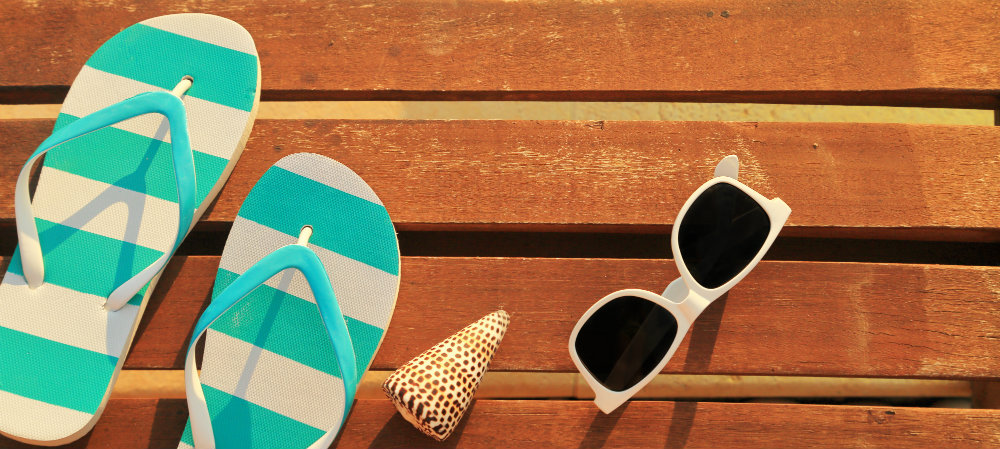Eye Safety on the Lake Michigan Beach
West Michigan natives know there’s nothing like a trip to the beach on a hot summer day!
We’ve already had a couple of scorching heat waves in our part of the globe this year, and no doubt more are on the way. So before you pack your beach bag and head out to the shoreline again, take a few minutes and give yourself a quick refresher on beach eye care.
Sunlight, sand, and even harmful microbes and bacteria can make your trip to Lake Michigan a tough one for your eyes, in both the short term or long term. But if you follow these tips, you should be able to reduce your risk of eye damage and irritation.
Wear A Good Pair of Sunglasses
Sunglasses can protect the surface of your eyes from harmful rays and wind-whipped sand while at Lake Michigan.
But not all sunglasses are created equal.
Most sunglasses offer good UV-A and B protection, but you’ll want to make sure you have the right pair for you and your specific needs.
Like most of your body, the surface of your eye is subject to solar damage. Some people wear sunglasses to reduce their risk of cataracts and macular degeneration. Although sunlight had NOT been proven to be a contributor to cataracts and macular degeneration in scientific studies, it still makes good sense to optimize your vision in high glare conditions with high quality sunglasses.
One other point about sunglasses—the bigger the better! Or, more accurately, sunglasses that fully cover your eyes on all sides, like wraparound shades, are the best choice.

Seek the Shade
In addition to your sunglasses, you can further protect your eyes by seeking the shade of a wide-brimmed hat, beach umbrella, or both. These tools can be especially helpful if your sunglasses aren’t quite wrap-around in design, as they provide an additional barrier against sunlight. The best sun hats should have a brim at least three inches wide.
The sun’s rays are the longest and most damaging in the hours around noon—roughly 10 a.m to 2 p.m. However, the sun’s UV rays can damage your unprotected eyes throughout the day.
It’s also important to remember the clouds don’t provide full protection, either. Even on a solidly overcast day, as much as 30% of UV light still makes it to the surface. And for reasons we don’t yet completely understand, UV exposure can actually be higher in partly cloudy weather than clear skies.
Take Out Your Contacts Before You Get in the Water
Regardless of what type of contacts you wear, going swimming in them is strongly discouraged.
The main risk is bacterial contamination. Many potentially harmful microbes, viruses, and other organisms that live in water can attach to your lenses and infect or irritate your eyes.
For example, freshwater lakes (like our own Lake Michigan) harbor Acanthamoeba, a single-celled organism that’s usually harmless to humans, but can cause significant cornea damage (and even vision loss) when trapped between a contact lens and the eye.
There are other downsides to wearing contacts in water. Contacts can dislodge from your eye and damage them in the process—gas-permeable lenses are especially likely to do this. Soft lenses, meanwhile, are more likely to become waterlogged or to tighten and shrink on your eye.
Daily disposable is probably the “safest” to wear contacts out in the water, especially if you throw them out immediately after swimming. But even these will still significantly increase your infection risk.
The safest play is to take contacts out and swim without them. If your vision is too poor to swim safely without corrective lenses, we recommend that you only use daily disposable lenses with a pair of watertight swim goggles. Alternatively, you could get a pair of prescription swim goggles instead.
While We’re on the Topic of Goggles …
Whether you wear contacts or not, goggles really are the safest way to swim. With a good pair of watertight swimming goggles on, you keep the risk of waterborne infection, dry eye, sand damage, and other risks to an absolute minimum. Plus, they allow you to safely open your eyes underwater, which can be a lot of fun!
Sport goggles (prescription or otherwise) are also a good call if you normally wear glasses or contacts and are looking to enjoy a little volleyball or soccer on the sand. They’ll help protect your eyes and sharpen your vision, and won’t put your normal prescription eyewear at risk.
Don’t Take Unnecessary Risks with Your Eyes This Summer!
You’ve only got one set of eyes. Keeping them healthy and functioning properly is one of the most important things you can do to ensure your long-term quality of life.
If your eyes feel dry and irritated, or you notice blurry vision, eye pain, or any other symptoms after your trip to the beach, give us a call. We pride ourselves on our exceptional care for acute eye conditions, in addition to preventative care and yearly checkups. Addressing an eye problem as early as possible can help minimize or prevent long-term damage.
To schedule with us at our office in the Zeeland/Holland area, call (616) 772-2020 today or use our online contact form!
